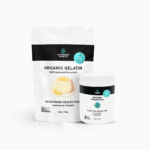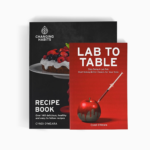‘Brain health’ is a term that can cover a huge range of things – your cognition, memory, clarity, emotions, ability to sleep, mental health and so on. And, just as brain health applies to so much, there are many factors that may contribute to someone not feeling on top of their game.
Let’s look at gut health as an example. When your gut microbes are out of balance or when there is an overgrowth of parasites, yeasts or bacteria, it can have a profound impact on your brain health. An imbalance can create inflammation in the central nervous system (which includes your brain), an over production of neurotoxic metabolites like lactic acid and ammonia (which can be destructive to nerve tissue), an imbalance in the production of neurotransmitters and hormones that affect our mood and cognition and modify our stress response, and more.
Your brain is impacted by what you eat and whether the food is providing the nutrients required for brain health, creating inflammation, and feeding the correct microbes in your gut. Moreover, hormones such as leptin and insulin that have been shown to be related to emotions and cognition are stimulated by your gut.
Foods that are known to cause inflammation include wheat, corn, soy, vegetable oils and other foreign additives that we do not recognise and that are created by science. These foods could potentially wreck havoc on your gut microbiome and, therefore, your brain health due to the heavy processing they have been through.
Foods and Nutrients to Consider for Optimal Gut and Brain Health
There are many naturally occurring foods and vitamins that you might like to include in your diet to help boost your gut and brain health:
Essential fatty acids – The consumption of omega-3 fatty acids and their role in brain health has been exceptionally well studied. Docosahaxaenoic acid (DHA) is the most abundant omega-3 fatty acid in the brain’s cell membranes, and we are hugely dependent on dietary DHA. There is much archaeological evidence showing that communities living along the shore and consuming a lot of DHA have larger brains through evolution, known as encephalization. You can obtain DHA through foods like fatty fish, cod liver oil, inca inchi oil and hemp seed oil.
Antioxidants – Antioxidants are essential to delay cognitive decline in the elderly and improve and support overall brain health. There are many forms of antioxidants, though nutrients like vitamin A, C and E are potent, easily accessible antioxidants. Polyphenols are potent antioxidants, and berries, cacao and coffee are all rich in polyphenols.
Vitamin B12 – Low B12 levels have been associated with low BDNF (brain-derived neurotrophic factor), a protein that is essential for proper brain function and in particular long-term memory and proper neural development. Many individuals are deficient in B12 but to confirm this it is best to get tested. For the most accurate indication, I suggest an Organic Acids Test, which you can do with some practitioners.
Probiotics and foods that support a healthy gut – Good gut bacteria assist in keeping inflammation in check (inflammation is a huge precursor to a decline in brain health), reduce the risk of leaky gut, and produce components required for brain health like BDNF, B12 and GABA, which helps keep you calm.
Cholesterol – The brain requires cholesterol in order to thrive, and, in fact, low serum cholesterol levels are linked to lower cognitive function. Cholesterol acts as an antioxidant and is a precursor to other essential nutrients for brain health, like vitamin D, and is also essential for the function of neurons and the building of cellular membranes.
Other potent foods that may help brain function:
- Lion’s mane mushroom – has a positive effect on neuronal functions which improves memory, focus, clarity and mood.
- Ashwaghanda – has neuroprotective benefits, improves brain health, decreases anxiety and improves sleep. It has been shown to serve as a potential preventative and therapeutic herb for neurodegenerative disorders.
- Peppermint – increases clarity and focus.
- Rosemary – increases memory.
If you or a loved one is suffering any form of mental issues, fogginess, memory loss or alike, I would first recommend moving towards an anti-inflammatory diet, starting to correct nutrient deficiencies, and correcting any imbalance in your gut flora. I cannot stress enough the importance of addressing what is going on in your gut first and foremost, as it may be the source of why you are feeling off and not absorbing or manufacturing nutrients in the first place. I really hope this gives you a start, or encourages you to look deeper into the cause of your symptoms, knowing you have the potential to feel better.
Sheridan Williamson
Nutritionist








It seems quite relevant to indicate how to know what your gut health is. Is there a sure fire way of analyzing it?
Hi Bryan. We would advise talking to your chosen healthcare provider who will be able to assist here.